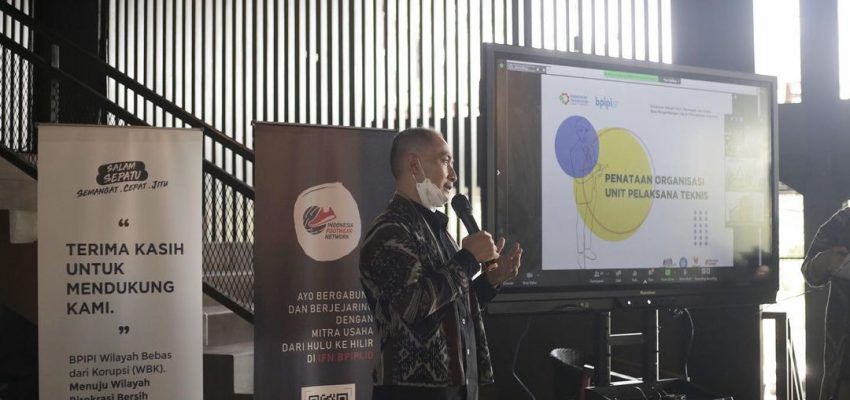Berdasarkan hasil penjurian dengan penilaian yang ketat oleh Dewan Juri, ditambah dengan presentasi bagi para…

Strengthening the Footwear Industry Ecosystem through the BPIPI Partnership Program
Globally, the footwear industry is experiencing challenges due to the impact of the COVID-19 pandemic. The world's footwear production performance in 2020 reached 20.4 billion pairs. Indonesia still occupies the top 4 (four) largest global producers. In 2019, despite the pandemic, Indonesia managed to produce 1.03 billion pairs.
Global footwear consumption is still controlled by China, with a contribution of 20.8% in 2020. The impact of this pandemic also affects domestic footwear consumption. In 2020, Indonesian footwear consumption at 821 million pairs was ranked in the top 4 in the world.
Export performance globally was also depressed due to disruptions in the supply of materials and materials. As the world's largest exporter, China experienced a 2.5% decline in footwear exports from 9.5 billion pairs to 7.4 billion pairs. In 2020, Indonesia is still ranked 3rd in the world by exporting 366 million pairs of footwear worldwide.
The dynamics and changes landscape in the competitive landscape of the global footwear industry must be seized as an opportunity for Indonesia to strengthen the upstream sector of local materials and materials so that they have more resilience during a pandemic like the current one. The strengthening of the supply chain from upstream to downstream is aimed at supporting the domestic footwear industry and continues to be encouraged with a strategy of strengthening the domestic footwear industry ecosystem through national partnership programs. This includes the need for a method to enhance the upstream materials and materials industries to support local production, which is currently being driven by local brands of footwear that have overgrown in the last 1 (one) decade.
Looking at the performance of the footwear industry in 2021 during this pandemic, it should be appreciated because it is still able to survive. The footwear industry's growth in semester 1 of 2021 increased by 2.4% compared to the same period in 2020, which was still minus 4.5%. The contribution of the footwear industry to GDP in semester 1 of 2021 also showed a positive number at Rp. 13.8 trillion compared to the same period in 2020 of Rp. 13.5 trillion.
There is an exciting phenomenon for investment performance, with the decline in footwear production in China, Vietnam, and Indonesia being the main alternative destinations for world production. In 2020 semester one, the value of foreign investment (PMA) is USD 90.9 billion, increasing to USD 187.5 billion in the same period in 2021. Support for a better investment climate is expected in 2022 to increase production capacity significantly.
The performance of national footwear exports and imports experienced a surplus. The value of national footwear exports has increased, even though Indonesia's market share has declined globally. The value of footwear exports has increased, data in semester 1 of 2020 the value of Indonesian exports reached the US $ 2.49 billion, up to USD 2.85 billion in the same period in 2021. For import performance, in 2019 imports of footwear reached a value of USD 873 million and down in 2020 to USD 617 million. Meanwhile, in Semester 1 of 2021, footwear imports reached a value of USD 349 million.
Analyzing the dynamics of the global and domestic industry, especially footwear, the opportunity for the domestic footwear industry is still very potential, especially the export market and the disruption of the supply chain of materials during the pandemic can be used as a momentum for the growth of the component industry, footwear materials and materials can grow better by supplying footwear industry needs. On the downstream side (raw materials), with increasing domestic demand, it is hoped that it will be able to fulfill the substitution of the need for raw materials for footwear both in terms of quality and price so that the competitiveness of the upstream industry is better than before.
The Indonesian Shoe Industry Development Center, Directorate General of IKMA, Ministry of Industry, sees the above phenomenon as momentum to strengthen the footwear industry ecosystem through industrial partnership programs. In this case, the benefits of the partnership strategy, the footwear IKM with the large footwear industry, and vice versa, provide benefits for market certainty, price certainty, production certainty, and business sustainability amid uncertainty due to the pandemic.
The Partnership Program has been mandated in Law No. 3 of 2014 concerning Industry and Government Regulation No. 29 of 2018 concerning Industrial Empowerment where one of the important roles of BPIPI is to provide facilities for the development, strengthening of linkages and partnership relationships of small, medium and large industries with the principle of mutual benefit.
Through Customer Gathering activities, BPIPI's role in facilitating partnerships in the footwear industry sector is to bring together potential supply and demandThis partnership also provides opportunities for SMEs, large footwear industries, and materials industry, production vendors, and local brands to introduce capabilities, production capacity, needs, and quality of products and services to other industry players.
During this pandemic, a high level of localism and market optimism emerged in the domestic footwear industry. The disruption of global supply chains and the pandemic's impact have given local brands new enthusiasm to make changes and breakthroughs to continue to grow in the current market situation.
The partnership opportunities in the footwear industry sector will be even more excellent in the future. With more than 18,657 business units in the footwear industry (including small, medium, and large industries) and a workforce of 247,843 people, the opportunity to increase industrial value-added through partnership strengthening programs is expected to increase export-oriented production capabilities while increasing domestic consumption. Thank You
Data Source
- World Footwear Yearbook 2021, APICCAP
- Peta Potensi Industri Alas Kaki, BP
- IndoAnalisis – Industri Alas Kaki Semester 1 2021.



This Post Has 0 Comments